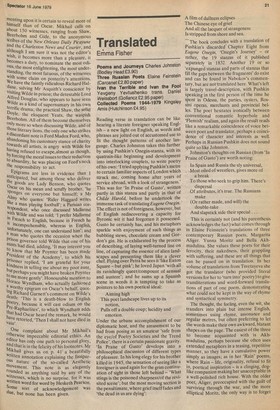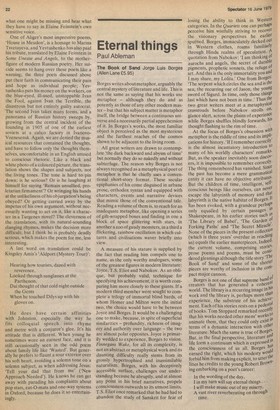Translated
Eriirna Fisher
Poems and Journeys Charles Johnston (Bodley Head £3.90) Three Russian Poets Elaine Feinstein (Carcanet £2.80 paper) Ivan the Terrible and Ivan the Fool Yevgeny Yevtushenko trans. Daniel Weissbort (Gollancz £2.95 paper) Collected Poems 1944-1979 Kingsley Amis (Hutchinson £4.95) Reading verse in translation can be like hearing a literate foreigner speaking English — a new light on English, as words and phrases are jolted out of accustomed use to fit the thought patterns of another language. Charles Johnston takes this further by using Pushkin's Onegin-stanza, with its quatrain-like beginning and development into interlocking couplets, to write poetry of his own: 'I tried applying Pushkin's metre to certain familiar aspects of London which struck me, coming home after years of service abroad, with a look of strangeness.' This was for 'In Praise of Gusto', written partly in this stanza and partly in that of Childe Harold, before he undertook the immense task of translating Eugene One gin. The effect is not of foreigness, however, but of English rediscovering a capacity for Byronic wit it had forgotten it possessed. Gusto he certainly has, and his metaphors sparkle with enjoyment of such things as bubbling stews, chocolate cream and Gordon's gin. He is exhilarated by the process of describing, of laying well-turned line on line, of capturing the essence of alien landscapes and presenting them like a clever chef. Flying over Petra he sees it 'like Eaton Square — but pink'; he loved Japan 'with all its ravishingly queer/compount of sensual and austere'; and he sums up a Spanish scene in words it is tempting to take as pointers to his own poetical ideal: Aiming high This poet landscape lives up to its notion, Pulls off a double coup; lucidity and emotion.
Under the urbane accomplishment of our diplomatic host, and the amusement to be had from posing as an amateur 'safe from the eye/of Poetry Societies and the Trend Police', there is a certain passionate gravity. 'In Praise of Gusto' develops into a philosophical discussion of different types of pleasure. In his long elegy for his brother killed in 1945, the sensation of seeing like a foreigner is used again for the grim continuation of sight in those left behind — 'What stings is the poisoned sharpness/of the revisited scene'; but the most moving section is the penultimate, where grief itself fades and 'the dead in us are dying': A film of dullness eclipses The Chinese eye of grief And all the lacquer of strangeness Is stripped from shore and sea.
The book concludes with a translation of Pushkin's discarded' Chapter Eight from Eugene Onegin, `Onegin's Journey' — or rather, the 19 stanzas of it published separately in 1832. Another 19 or so 'expunged stanzas and parts of stanzas that fill the gaps between the fragments' do exist and can be found in Nabokov's commentary, but are not translated here. What's left is largely travel-description, with Pushkin speaking in the first person of the time he spent in Odessa, the parties, oysters, Rossini operas, merchants and provincial belles. The poet hesitates ironically between conventional romantic hyperbole and 'Flemish' realism, and again the result reads like a remarkable coincidence of voice between poet and translator, perhaps a coincidence of character and interests as well. Perhaps in Russian Pushkin does not sound quite so like Johnston.
Johnston's thoughts on Russian (from 'In Praise of Gusto') are worth noting: In Spain and Russia the sly universal, Most oiled of wrestlers, gives more of a break To those who seek to grip him. There's dispersal Of attributes, it's true. The Russians make (Or rather made, and will) the double-take And slapstick side their special. . .
This is certainly not (and his parenthesis acknowledges the fact) what comes through in Elaine Feinstein's translations of three contemporary Russian poets, Margarita Alter. Yunna Moritz and Bella Akhmadulina. She values these poets for their ferocity, their nakedness, their grappling with suffering, and these are all things that can be passed on in translation. In her volume of translations from Tsvetayeva she got the translator (who provided literal versions for her to 'turn into' poetry) to give transliterations and word-forward translations of part of one poem, demonstrating what could not be kept in the way of rhyme and syntactical symmetry.
The thought, the feeling, even the wit, she transfers into plain but intense English, sometimes using rhyme, assonance and regular metres, but often preferring to let the words make their own awkward, blatant shapes on the page. The easiest of the three to become acquainted with is Akhmadulina, perhaps because she often uses extended metaphors in a teasing, repetitive manner, so they have a cumulative power simply as images; as in her 'Rain' poems, where Rain — life, originality, refusal to fit in, poetical inspiration — is a clinging, doglike companion making her unacceptable in a well-polished rich house. With the older Poet, Alter, preoccupied with the guilt of surviving through the war, and the more elliptical Moritz, the only way is to forget what one might be missing and hear what they have to say in Elaine Feinstein's own sensitive voice.
One of Aliger's most impressive poems, 'House in Meudon', is a homage to Marina Tsvetayeva, and Yevtushenko has also paid his tribute, translated by Elaine Feinstein in Some Unease and Angels, to the motherfigure of modern Russian poetry. Her suicide seems to hang over these poets like a warning; the three poets discussed above put their faith in communicating their pain and hope as individual people; Yevtushenko puts his money on the workers, on the blue-eyed, ill-used, unstoppable Ivan the Fool, against Ivan the Terrible, the disastrous but not entirely guilty autocrat. The second Ivan takes many forms, and a panorama of Russian history sweeps by, growing from the central incident of the founding in 1905 of one of the earliest soviets at a calico factory in IvanovoVoznesensk. Again, we are denied the musical resources that contained the thoughts, and have to follow only the thoughts themselves, uncomfortable in an English unused to conscious rhetoric. Like a black and white photo of a coloured picture, the translation shows the shapes and subjects, not the living tones. The tone is hard to pin down: is he serious? Or is he laughing at himself for saying 'Remain unsullied, proletarian firmament'? Or wringing his hands at the unlikeliness of his objurgation's being obeyed? Or getting carried away by the impetus of his own argument, without necessarily wanting to act on it, like a character in a Turgenev novel? The cleverness of the translation, with its natural-sounding clanging rhymes, makes the decision more difficult; but I think he is probably deadly serious, which makes the poem for me, less interesting.
A last word on translation could be Kingsley Amis's `Aldport (Mystery Tour)': Hearing how tourists, dazed with reverence, Looked through sunglasses at the Parthenon, Dai thought of that cold night outside the Gents When he touched Dilys up with his gloves on.
He does have certain affinities with Johnston, especially the way he fits colloquial speech into rhyme and metre with a conjuror's glee. It's his attitude that is different. When young he sometimes wore an earnest face, and it is still occasionally seen in the odd poem about family life like 'Wasted'. But generally he prefers to flaunt a sour exterior over his soft heart, avoiding a solemn tone on a solemn subject, as when addressing Jesus: 'Tell your dad that from me' (New Approach Needed'). He knows he can get away with parading his complaints about pop stars, eat-O-mats and one-way systems in Oxford, because he does it so entertainingly.



































 Previous page
Previous page